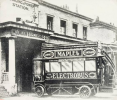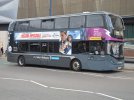-
Welcome to this forum . We are a worldwide group with a common interest in Birmingham and its history. While here, please follow a few simple rules. We ask that you respect other members, thank those who have helped you and please keep your contributions on-topic with the thread.
We do hope you enjoy your visit. BHF Admin Team
You are using an out of date browser. It may not display this or other websites correctly.
You should upgrade or use an alternative browser.
You should upgrade or use an alternative browser.
Zero Emission Buses
- Thread starter Heartland
- Start date
But there is still the problem of charging. We have one or two in Reading. They are quiet, smooth and fast aceleration. but they cannot do a fjull days work but have to be retired part way through the day for charging. this will change with stronger batteries though
devonjim
master brummie
Trolley Buses? Perhaps the metro will come into it's own when "driverless " tech arrives.But there is still the problem of charging. We have one or two in Reading. They are quiet, smooth and fast aceleration. but they cannot do a fjull days work but have to be retired part way through the day for charging. this will change with stronger batteries though
Lloyd
master brummie
Already solved. Terminal points will have recharge points like thisBut there is still the problem of charging. We have one or two in Reading. They are quiet, smooth and fast aceleration. but they cannot do a fjull days work but have to be retired part way through the day for charging. this will change with stronger batteries though
mw0njm.
A Brummie Dude
electric buses are old hat now london had them in 1906
The batteries didn’t last an entire day, but as they were in a cradle underneath the bus, all that they had to do was drive onto an elevated ramp at lunchtime at the bus depot and the depleted batteries could be swapped over for fresh ones in just three minutes.


The batteries didn’t last an entire day, but as they were in a cradle underneath the bus, all that they had to do was drive onto an elevated ramp at lunchtime at the bus depot and the depleted batteries could be swapped over for fresh ones in just three minutes.

Eric Gibson
master brummie
Take a look at this company for today's battery swapping. https://www.januselectric.com.au/electric buses are old hat now london had them in 1906
The batteries didn’t last an entire day, but as they were in a cradle underneath the bus, all that they had to do was drive onto an elevated ramp at lunchtime at the bus depot and the depleted batteries could be swapped over for fresh ones in just three minutes.
View attachment 183062
Lloyd
master brummie
Transport companies operating lorries and buses often lease tyres, paid for on a mileage and time basis. The same could be done for batteries, saving on immediate purchase cost and the problem to the operator of 'end of life' disposal of them and their chemical content.
Last edited by a moderator:
Eric Gibson
master brummie
Have a look at Janus trucks in Australia Lloyd. Here's a starter.
https://www.januselectric.com.au/
https://www.januselectric.com.au/
Lloyd
master brummie
Already have, Eric. I have a friend who works for Switch Mobility (https://www.switchmobilityev.com/en) and can get a glimpse into the market through him.Have a look at Janus trucks in Australia Lloyd. Here's a starter.
https://www.januselectric.com.au/


